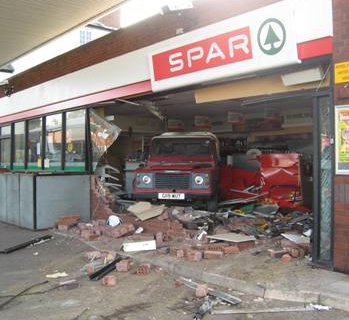Difference between revisions of "Security issue: Ram raid"
| Line 7: | Line 7: | ||
== Description == |
== Description == |
||
| + | [[Image:ramraid.jpg|thumb|right|600px|Results of a ramraid]]This act has occurred since at least the mid 1930s. The term came into widespread use after a series of such raids in [[Belfast]] in 1979 that was covered in news reports and in countries such as Australia that inspired a series of similar crimes. |
||
| − | [[Image:ramraid.jpg|thumb|right|600px|Results of a ramraid]] |
||
| + | |||
| + | Notably, large trucks are used to break into technology companies and steal high-value equipment for resale on the [[black market]]. |
||
| + | [[Image:Bollard ramkraakbeveiliging.jpg|thumb|right|240px|A [[bollard]] in front of a shop to deter ram raiders.]] |
||
| + | Commercial properties in areas prone to ram-raids often erect strong [[wiktionary:barrier|barriers]] or obstructions, such as [[bollard]]s, to discourage such attacks. [[Automated teller machine|ATM]] centres are also victims of ram-raiding. |
||
| + | |||
| + | Many companies have come up with solutions to ram-raiding.<ref>[http://www.dailytelegraph.com.au/money/atm-ram-raiders-foiled/story-e6frezc0-1111117254514 'Raminator' foils ATM ram raids.] ''The Daily Telegraph.'' 21 Aug. 2008.</ref> Everything from electronic bollards to electronic barriers have been employed to keep property from the raiders.{{Citation needed|date=March 2009}} |
||
| + | |||
| + | Another solution is security guards, but teams of "round the clock" security are expensive and often not the most economical way of dealing with ram-raiding. |
||
| + | |||
== Attributing circumstances == |
== Attributing circumstances == |
||
Revision as of 10:00, 8 August 2012
Contents
Security issue: Ram raid
Introduction
Ram raid is a particular technique for commercial burglars to gain access to primarily commercial premises, by means of driving -usually stolen- vehicles into locked or closed entrances, exits or windows.
Description
This act has occurred since at least the mid 1930s. The term came into widespread use after a series of such raids in Belfast in 1979 that was covered in news reports and in countries such as Australia that inspired a series of similar crimes.
Notably, large trucks are used to break into technology companies and steal high-value equipment for resale on the black market.

Commercial properties in areas prone to ram-raids often erect strong barriers or obstructions, such as bollards, to discourage such attacks. ATM centres are also victims of ram-raiding.
Many companies have come up with solutions to ram-raiding.[1] Everything from electronic bollards to electronic barriers have been employed to keep property from the raiders.Template:Citation needed
Another solution is security guards, but teams of "round the clock" security are expensive and often not the most economical way of dealing with ram-raiding.
Attributing circumstances
Impacts
Measures
Footnotes and references
- ↑ 'Raminator' foils ATM ram raids. The Daily Telegraph. 21 Aug. 2008.
MAP
<websiteFrame> website=http://securipedia.eu/cool/index.php?concept=Risk width=100% border=0 scroll=auto align=middle </websiteFrame>
<headertabs/>
